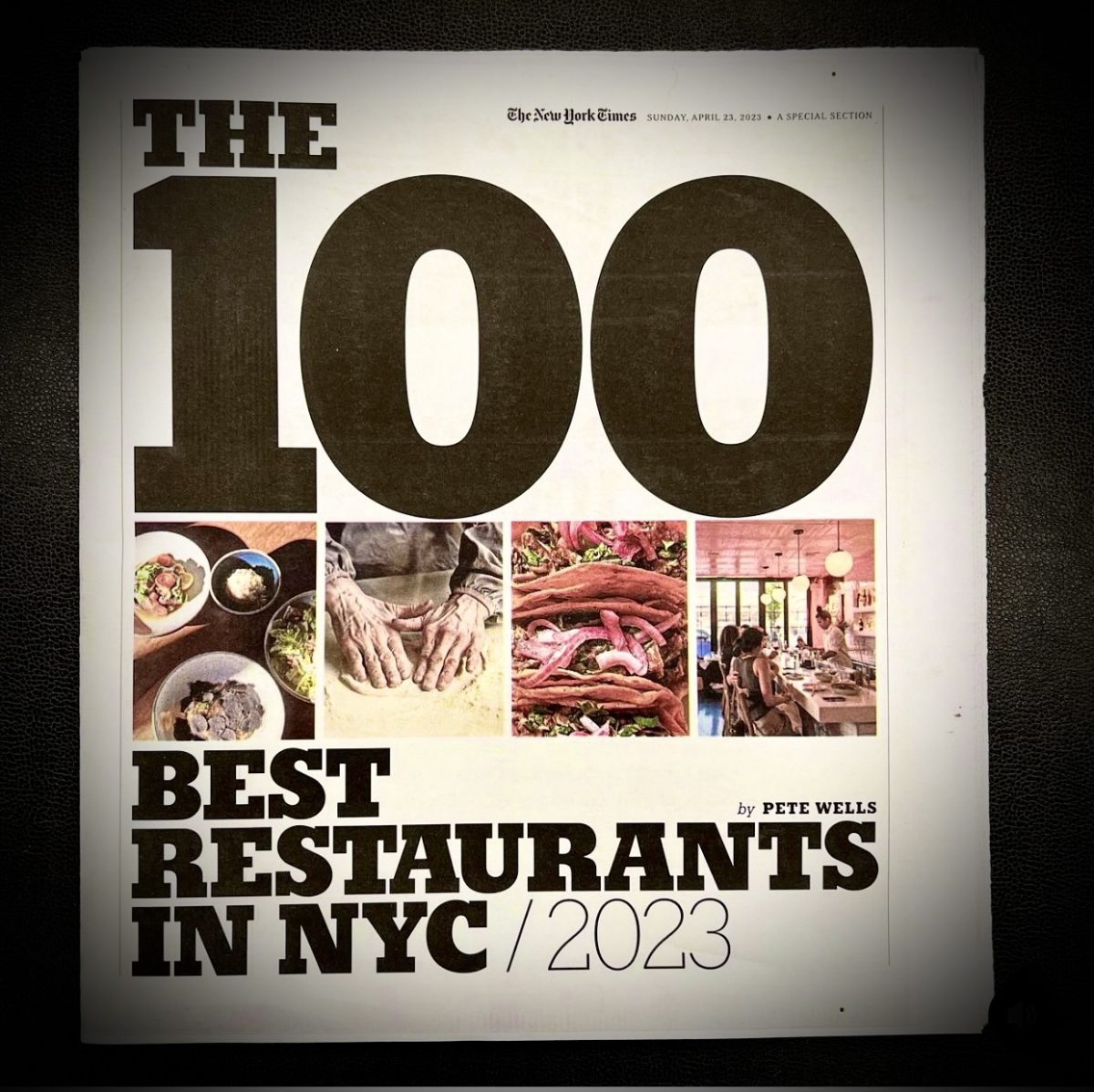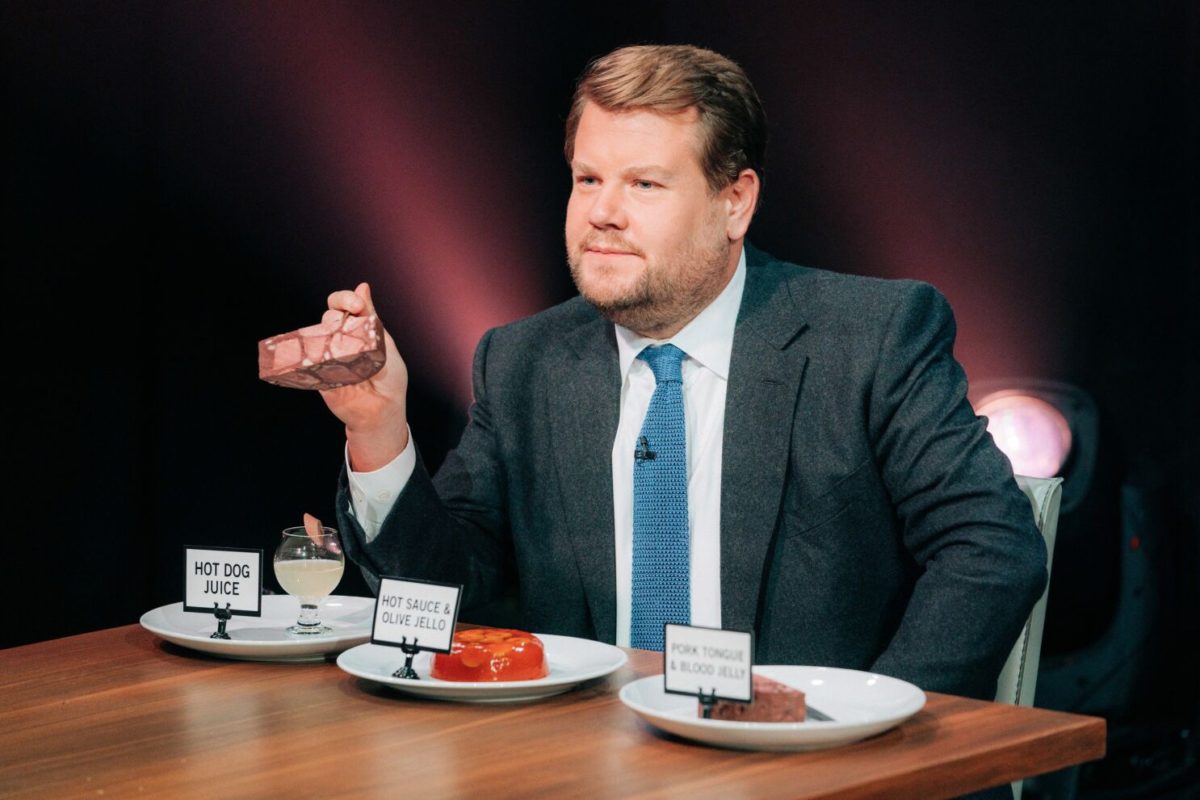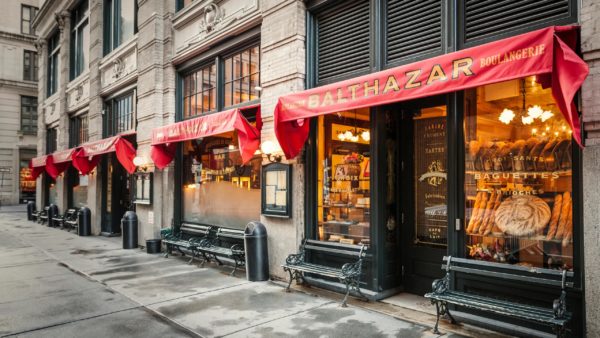We live in a world of arbitrary listicles. The 17 Best Trader Joe’s Vegan Party Snacks. The 21 Best Celebrity-Owned Tequilas For Non-Tequila Drinkers. The Top 30 Farm-to-Table Brunch Spots to Come Out to Your Parents. Of course, spirited debate over favorite movies, the most dominant athletes, or the best albums of all time can be a nice diversion. We need all the diversion we can get these days. But when we talk about ranking restaurants, the subjective nature of an individual’s taste makes the conversation considerably more complicated and, not gonna lie, a bit exhausting. The more that food media saturates the market with these frivolous best restaurant lists, the more I wonder: Why are we so obsessed with ranking restaurants?
Last week, Pete Wells, the New York Times’s venerable chief restaurant critic, broke with tradition by publishing a comprehensive list of NYC’s 100 Best Restaurants in the first half of the year. Distributing medals isn’t historically a springtime concern on the NYT Food desk; Wells typically waits until the holidays to hand out Christmas presents. I understand why his editors decided to do it. The Times and other legacy media outlets are lagging behind in attracting younger readers, a demographic conditioned to scrolling listicles on sites like Eater and Infatuation. “Best” lists are fodder for engagement, surefire clickbait, and driving traffic is seemingly all that matters in food media these days (perhaps, in all digital media).
Delving into his list, I noticed my former employer, The Grill, ranked #10 — a luxurious mid-century chophouse in the opulent former Four Seasons restaurant space in midtown Manhattan. Simply on the merits of its food and service, it’s well deserving of recognition. But it was a bit of a surprise to see The Grill ranked so highly, because Wells has been critical of Major Food Group (the parent company of The Grill and Carbone) in the past about its refusal to hire women in visible front of house roles. In his Top 100, Wells writes obsequiously about the trio of narcissistic owners: “Yeah, yeah, yeah. I’ve heard all the complaints about the arrogance of Major Food Group. I’ve made a few myself. But listen: The Grill is a perfect New York restaurant, despite this flaw and because of it.” This feels like the type of lazy observation Wells (or any other critic for that matter) might’ve made about Mario Batali or Ken Friedman years ago. The bravado is startling. Only a tenured, white, male critic could piss into the wind so confidently without worrying that it might blow back into his face.
When Wells bestowed a three-star review on Carbone in June 2013, he doted on the jokey all-male character actors that worked the dining room, with one major caveat. “I’m not ready to play along with all of Carbone’s casting decisions,” Wells wrote, “currently all the captains, typically the most highly tipped employees, are men.” Then again in his August 2017 review of The Grill, also three-stars, he referenced an off-color joke by his male captain that compared a side dish on the menu named for JFK to the former President’s famous sidepiece: “It would work even better if Major Food Group hired more women for the dining room; it’s hard to imagine many female captains who would be O.K. with calling Marilyn Monroe ‘Jack’s pie.’” He reiterated the criticism once more in (yes, you guessed it) his three-star review of Torrisi this February.
Wells admits that Major Food Group’s carefully curated nostalgia for old New York inconveniently harkens back to a time when women wouldn’t be trusted in key roles or, in the case of Carbone and The Grill, as proper ambassadors of its unrepentant machismo. Yet, apparently, the company’s misogynistic tendencies aren’t enough to keep Wells from recognizing not only one but two Major Food Group restaurants as among the best in the city (their recently-opened reincarnation of Torrisi came in at #33) . Should anyone challenge Pete on this, he’ll likely insist that restaurant critics should be agnostic — there to evaluate the food and the experience, not to evaluate the quality of the proprietors. I sympathize with critics who wish their jobs could be this simple, so they can focus on their plates. The problem is: the world isn’t so simple anymore.
Especially in the wake of #MeToo and Black Lives Matter, critics shouldn’t be writing about restaurants in a vacuum anymore. We’ve learned that an agnostic approach leaves the door open for celebrating the wrong people. (See: Charlie Hallowell, Blaine Wetzel, John Besh, Paul Qui, et al). In some way, every critic has contributed to celebrating these undeserving chefs. It may seem unavoidable, but it isn’t if critics make more of an effort to look beyond the menu. Every time a new exposé comes out (as one recently did about Boston chef Barbara Lynch), we hear the words “open secret” to describe the perpetrators of the abuse. If there are open secrets out there, Wells and other prominent food critics need to make it their responsibility for knowing them and calibrating their coverage accordingly.
It isn’t just MFG’s inclusion on this list that raises questions. According to detailed reporting on his former business partner Thomas Carter’s history of abusive behavior, Chef Ignacio Mattos, the owner of two restaurants that appear on Wells’s list (Estela and Lodi), allegedly tolerated Carter’s harassing subordinates while managing the dining room operations at Estela. Mattos himself was never directly accused of wrongdoing, but he was a party to serial misconduct by a cohort (sources describe having witnessed Mattos sitting next to Carter while he abused employees without taking corrective action). Could Wells not find enough chefs in the city worthy of this honor who didn’t actively (or passively) contribute to a hostile work environment? New York City is the home to thousands of talented chefs and restaurants who not only serve incredible, inspiring food but also contribute to their broader communities as a source for good.

Soleil Ho was the closest we’ve had to a restaurant critic that dared to appraoch restaurant criticism with a wider lens. Sadly, after a four-year tenure covering restaurants for the San Francisco Chronicle, Ho moved on to focus on culture writing at the paper. They didn’t say it in so many worlds, but contextualizing restaurant reviews against the backdrop of social justice was likely exhausting. But that doesn’t mean we still shouldn’t expect more from food critics. The restaurants that powerful critics like Wells choose to celebrate shape the dining landscapes of our cities. When they make lists, the lists matter. But it’s harder to ascertain how they help. If it’s about calling more attention to under the radar greatness, Major Food Group doesn’t need the boost. It already has Drake and Rihanna.
To be fair, I believe that Wells has tried to be more mindful about diversity and isn’t ignorant of the way society’s views are changing toward restaurant culture. Wells deserves credit for putting together a more inclusive list that brings attention to many facets of New York City’s multi-cultural restaurant scene that have been ignored in the past. But zooming out for a moment, Wells recently celebrated his tenth year in the most influential position in the food world, a veritable monarchy without term limits. He’s a one-man Supreme Court of restaurant opinions. That’s simply too much power for one person in food media to have for that long.
I’ve argued in the past that Wells should consider abdicating his throne for that reason, to make room for new, more diverse voices. Whether you like his writing or not doesn’t change the fact that the New York Times has never had a person of color in the chief critic’s chair in the newspaper’s history. (Craig Claiborne began filing reviews for the paper in 1963.) Stepping down wouldn’t necessarily signal the end of his career at the Times. His predecessors like Frank Bruni and William Grimes both continued working in the newsroom for years in other capacities after they retired from the critic’s role.
I, for one, was thrilled when the NYT suspended their star review system during the pandemic. It was presented as a merciful act, but I think it was also a prudent one. Holding up a scorecard at the end of a thoughtful review makes it harder for readers to ascertain the nuances that made the experience special or disappointing. I can remember vividly working at new restaurants during the review period, where a Times critic would publish a review filled with glowing praise, then award a middling two stars. At the end of the day, the stars were all that mattered, especially to the future of the restaurant. It’s no different today.
Last year, I wrote for Bon Appetit about how the World’s 50 Best Restaurants List is like an obnoxious rich uncle. He jetsets around the world having expensive dinners in all the obvious places, primarily to brag to others that he’s dined in them. That piece was intentionally playful, but it didn’t capture how corrosive I think these lists really are. The outcome of the World’s 50 Best has a meaningful impact on the economic success of its awardees. It impacts the flow of investor dollars. Year after year, the 50 Best List ignores meaningful culinary achievements in Africa (save a few token white chefs in South Africa) and treats India — the most populous country in the world — like no one cooks professionally there.

The methodology behind the 50 Best List lacks transparency. But that’s not exactly surprising. Gatekeepers protect the locks on their gates by limiting who has access to the combinations. With so many restaurants struggling to survive, the restaurant industry doesn’t need outside prestige organizations and horny food media acolytes to encourage unhealthy competition. It needs these organizations to celebrate cooperation, community, and integrity — not arrogance and merciless expansion.
But the overarching question is: What exactly do we accomplish when we say that one restaurant is better than the other? Who does it serve when we rank restaurants like this? What’s the point of comparing a humble lechonera operating out of an immobilized trailer to a three-star Michelin omakase that charges $500 per person? If you look at who gets to author these influential lists, you won’t find a terrible amount of diversity in the club. Name one major BIPOC restaurant critic of any major American periodical, newspaper of magazine. You probably can’t because there aren’t any. If these lists aren’t compiled with the input of a diverse committee, the results are always doomed to be as myopic as the process.
In my humble opinion, we desperately need a new paradigm for how we recognize excellence in the restaurant world that doesn’t involve numerical rankings, arbitrary star systems, or the need to declare one restaurant superior to another. But until then, the least we can ask is for critics like Pete Wells to think about the restaurants they celebrate as more than just a sum of the food and service they offer. A more mindful approach encourages readers to better appreciate how restaurants fit into their communities on a deeper level. The pandemic taught a very harsh lesson about how desolate our lives are without having restaurants to take refuge in. By championing restaurant organizations like Major Food Group, that dedicate themselves to nation-building in other cities — making money to make more money while lagging behind on equity and inclusion —media helps sustain a backward-facing narrative. By celebrating groups that put profit over people, and prestige over integrity, Wells allows chefs and restaurateurs that are impacting their communities and advancing social justice in more meaningful ways to be overshadowed. Sorry, Pete, but “Yeah, yeah, yeah” isn’t gonna cut the proverbial mustard anymore.



